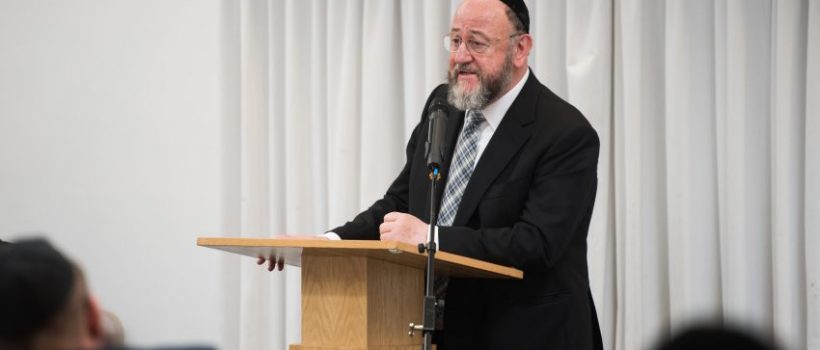Chief Rabbi: ‘We must stand together’

The Chief Rabbi issues an urgent call for unity in the Jewish community.
During the past two or so months I have been appalled by some of the conduct we have witnessed in our community.
Whilst we have learned that 70 per cent of British Jews who hold Synagogue membership identify, denominationally, as Orthodox, there is, of course, a hugely diverse range of approaches to Judaism within that grouping, from the most conservative parts of the Charedi community to the more progressively minded. Orthodoxy has long known significant differences in outlook, but the recent controversy about Rabbi Joseph Dweck’s teachings has brought the polarisation of Orthodox Jewry into sharpest focus.
“The time has come for modern Orthodox Jews to make their values clear” and to “sever all ties to Chareidim.” So declared one campaigner in the press. “If Joseph Dweck is maintained in office as a Rabbi … even partially, …” I was warned that I would be, “responsible for the splitting of Anglo-Orthodoxy…” by another.
‘People are affirming what they stand for by denigrating and insulting those whom they stand against. We have come to define ourselves by that which divides us, rather than that which unites us’
Social media, the press and our communities have been awash with poisonous invective, demonising other Jews in ways which are simply unacceptable. The problem runs so deep that it is now used as a hallmark of particular shades of Jewish identity. People are affirming what they stand for by denigrating and insulting those whom they stand against. We have come to define ourselves by that which divides us, rather than that which unites us.
Is this what we have become?
It is most sobering that I write these words during the three-week period between Shiva Asar B’tammuz and Tisha B’av. In Hebrew, this time is known as bein hametzarim, – within a set of constraints. Throughout Jewish history, it has been a time of immense grief, when the first and second Temples were destroyed. Our Sages teach that the reason the second Temple was destroyed was because of sinat chinam – ‘baseless hatred’. The people of the time were religiously observant and steadfast in their commitment to spiritual pursuits, but they treated each other with contempt – they were consumed ‘within the constraints’ of hatred and division. It was that terrible sin which ultimately destroyed the nucleus of everything they held dear.
‘If Jewish history has taught us anything, it is that we are at our weakest and most vulnerable when we are divided’
Indeed, if Jewish history has taught us anything, it is that we are at our weakest and most vulnerable when we are divided. The Talmud famously tells the story of a wealthy Jew whose servant accidentally invited his master’s enemy Bar Kamtza to a feast instead of his close friend of a similar name – Kamtza. Upon seeing his enemy at the party, the host publicly humiliated Bar Kamtza and ordered him to leave. Furious at his treatment and the fact that no-one bothered to interject on his behalf, Bar Kamtza conceived a plan to make it appear as though the Jews were rebelling against Roman rule. The Talmud states that it was this incident which precipitated the fall of our Temple.
We came close to total annihilation over an argument at a party.
Jewish unity is not a pleasant additional extra – it is fundamental to our survival. There are so many external threats to the Jewish world that if we cannot even treat each other with the most basic common courtesy, our very survival is at stake.
Those who have shamefully sought to focus their attention, to the point of obsession, on attacking the reputation of another human being, have become trapped bein hametzarim. There are times when we have a responsibility to object strongly to what we believe to be wrong, but to do so with this degree of personalised vitriol is not acceptable.
‘There are times when we have a responsibility to object strongly to what we believe to be wrong, but to do so with this degree of personalised vitriol is not acceptable’
And similarly, others have used this as an opportunity to malign parts of the Orthodox community with whom they disagree. Taking particular aim at Charedim, they have filled social media with a disparaging narrative, depicting them as ‘the enemy’ or some kind of threat which we must face down and they have become a part of the problem, not the solution. Not only is there no virtue in perpetuating this ‘them and us’ dynamic, it is actively damaging our community.
We need to be better able to discuss the things we find challenging. We need to do so in a dignified and responsible manner which is true to our precious mesorah (tradition) and which brings our community closer to Torah. The issues themselves are too important for us to do otherwise.
Our Sages teach that the Almighty has “found no vessel fit to hold blessing for the Children of Israel other than peace”. So, as we seek to move forward, I implore the community to resist the urge to sow further discord and division. Now, more than ever, we must stand together.
In doing so, may we emerge from ‘bein hametzarim’ with an enhanced sense of the good in each other so that we can build a positive future together for all of Klal Yisrael.

